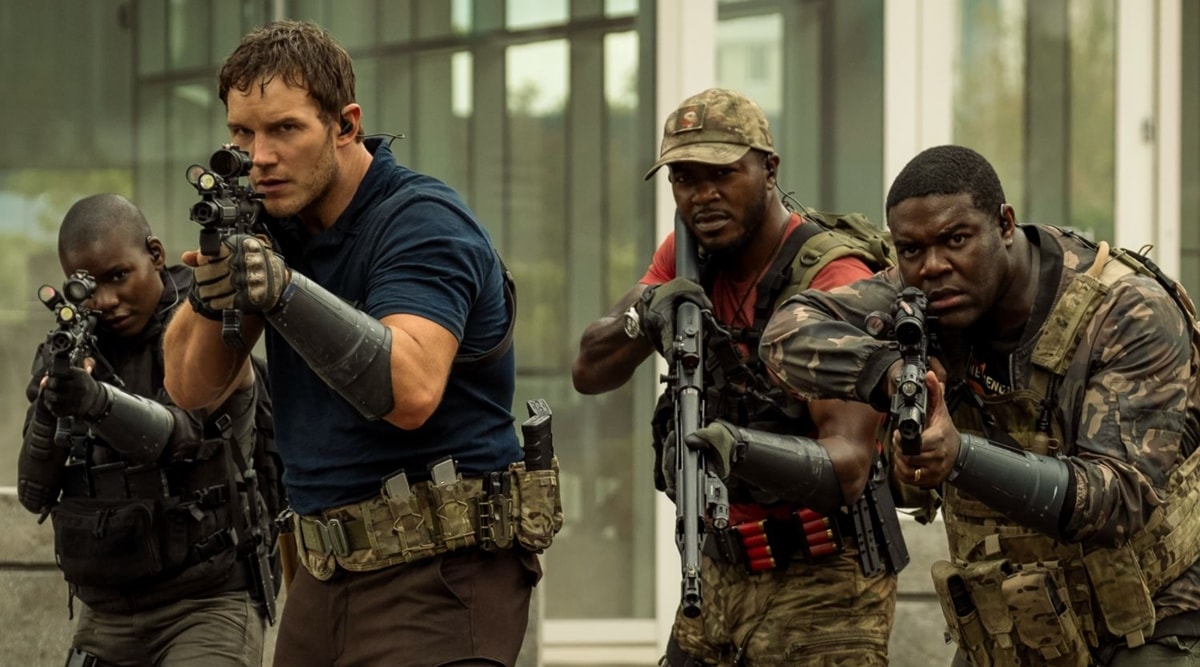The science fiction genre has always been partial to telling stories about ordinary, blue-collar men in new situations and new worlds. But unlike Chris McKay’s The Tomorrow War, they all contained a unique flair or a unique story: Paul Verhoeven’s Starship Troopers was a subtle satire about the dangers of war aside from its gaudy visuals, Independence Day drew people in for its promise of aliens and guns, but people loved the heartwarming performance from Will Smith, and the Hitchhiker’s Guide to the Galaxy movie perfectly captured Douglas Adams’ story with agreeable campiness. The Tomorrow War, where Chris Pratt plays an ex-military high school teacher who travels through time to fight aliens, tries to play out like all of these films, but ultimately fails.
Half an exploration of a father-daughter relationship, where the more serious moments ultimately fail to land, and half an alien invasion movie where you watch Pratt and his new team shooting low-rent Xenomorphs (seriously, they look the exact same…), The Tomorrow War has a predictable narrative arc, which bends towards everyone loving Pratt’s character. The film, like a lot of the films I mentioned earlier, tries to tie the “working-class hero” narrative with an action-hero idolatry, and by doing this for 2 hours, it’s overly repetitive.

The narrative tries very hard to separate from Chris Pratt idolatry, but ultimately fails to support anyone else or believe that they’re in the right. Dan Forester (Pratt) travels between 2021 and 2051, where in the latter year a group of aliens called Whitespikes have overrun the planet and killed 75% of the human population on Earth. The remaining humans ‘invented time travel’ for mysterious reasons (it’s never explained), and they inform humankind that their help is required to save the future in the “Tomorrow War.” This announcement takes place on television while Dan is watching soccer with his therapist wife Emily (Betty Gilpin) and super-smart daughter Muri (Ryan Armstrong). An Army veteran who now lives in Florida and teaches high school biology, Dan is estranged from his Vietnam vet father James (J.K. Simmons, very bearded this time around), who he goes to in search of support – and James ultimately tells him that he should feel a purpose in his life again.
When Dan is called to serve in the Tomorrow War due to his time as a veteran, his self-assuredness, calm demeanor, and willingness to lend a hand help him stand out from the other draftees. Kindhearted and chatty but ultimately gullible geologist Charlie (an embarrassingly underused Sam Richardson), doesn’t even know how to hold his gun, but serves as good comic relief when he’s not being overly-idolizing of Dan. And when they travel into the future through a blue and purple vortex of whooshing wind and flashing lights, Dan easily moves into a leadership role because it “reminds him of Iraq,” guiding the group forward.

The film is only “good” (and I’m using this word very lightly) when Chris McKay decides to do something sci-fi directors rarely dare to do unless their name is Ridley Scott: get gross. Green goop shoots out in all directions when aliens are shot, stabbed, impaled, or sliced. The aliens, who can’t be killed with guns, gnaw off their injured limbs in close-up shots, right before you see a dangerously close human get their blood splattered and die a horrific yet ultimately meaningless death. When The Tomorrow War acknowledges the brutality of warfare, and leans into that with scenes that emphasize the aliens’ strength, it provides a counterbalance to the rest of the two hours.
The result of this film? They only made the science fiction genre’s admiration of the average, blue-collar working man stronger. Chris Pratt is humanity’s last hope yet again, but the approach in this film is much more clobbering and clunky, so The Tomorrow War is constantly tripping over itself with weak writing, corny special effects (and not even good ones), and a sappy plot. It doesn’t flesh out anyone else’s story, just trying to persuade us into worshipping a suburban hero as much as everyone else in this film, and failing to deliver any honest criticism of war or potential threats to humanity. While there are some welcome interruptions, mostly from Sam Richardson and Betty Gilpin serving as comic relief and a warming presence in this otherwise bleak premise, this film lacks any unique identity of its own.
2/5 STARS
